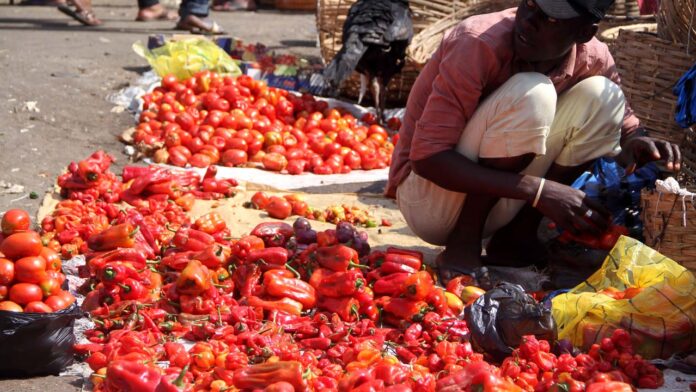As the 2024 Eid Kabir celebrations draw near, prices of both perishable and non-perishable food items have surged by over 300 per cent in major markets in Lagos.
A recent survey conducted in markets such as Mile 12, Oyingbo, Surulere, and Ajah revealed that food prices have increased by almost 400 per cent in some cases within a year.
For instance, a 50-kilogram basket of tomatoes, which was sold for N35,000 in 2023, is now priced at N100,000 at Mile 12 and as high as N120,000 in upscale areas like Lekki and Ajah.
The price of a 50-kilogram bag of Scotch Bonnet peppers, popularly known as “rodo” or “atarodo,” has risen by over 600 per cent, selling for N120,000 compared to the previous N18,000.
Similarly, a 50-kilogram basket of bell peppers, also called “tatashe,” has increased to N95,000 from N21,000, while the same quantity of red chili peppers, known as “bawa” or “shombo,” now sells for N110,000, up from N22,000 in 2023.
The survey also revealed that a 100-kilogram basket of onions is currently selling for N70,000, up from N25,000 in the previous year.
Additionally, the price of a 50-kilogram bag of local rice, which sold for N48,000 last year, now goes for N65,000, while the same quantity of imported rice, which was priced at N55,000 in 2023, is now being sold between N80,000 and N90,000, depending on the buyer’s purchasing power.
The cost of animals used to celebrate the festival, such as rams, cows, and goats, has also soared.
A medium-sized ram now ranges from N350,000 to as high as N700,000, a cow ranges from N800,000 to N1,000,000, and a goat from N75,000 to N120,000, depending on the bargaining strength of the buyer.
Prices of eggs and chickens have also increased, with a crate of eggs now selling for N4,500 compared to N1,800 in 2023, and chicken prices rising from N8,000 to N12,000 for old layers and N15,000 for broilers.
Mr. Femi Odusanya, spokesperson for Mile 12 International Market, Lagos, attributed the rising food prices to high levels of insecurity for farmers.
He noted that farmers are no longer able to farm effectively due to banditry, kidnapping, and killings on farmlands across the country. Odusanya also mentioned that the high cost of transportation has contributed greatly to the inflation currently being experienced in food items.
He called on governments at all levels to subsidize the entire agricultural value chain and provide adequate security to encourage more people to go into farming. Odusanya emphasized the need for state governments to do more in the area of agriculture and reduce reliance on federal allocations.
A cross-section of Nigerians have expressed concerns about the country’s current inflationary pressures and are seeking interventions from governments to mitigate its impacts on ordinary citizens.
Dr. Fatai Akomolafe, a nutritionist, warned that pockets of malnutrition are beginning to emerge in different parts of the country due to the high cost of food items. He emphasized the need for urgent action to provide critical food components to the needy to reduce mortality rates.
Mrs. Charity Ephraims, a businesswoman, noted the increase in the number of begging Nigerians on the streets, attributing it to the high cost of food.
She appealed to the government to reduce food prices to ensure that people can afford to eat and contribute to the nation’s economy.
Alhaji Bala Tanko, a pepper trader, revealed that even as a seller, he cannot afford to consume what he sells at the current prices.
He urged the government to deploy more security surveillance to farm areas to encourage farmers to return to farming and help reduce food prices.
Tanko also called for subsidised transportation systems and reduced levies to aid the transportation of food components across the country until prices become more affordable.




